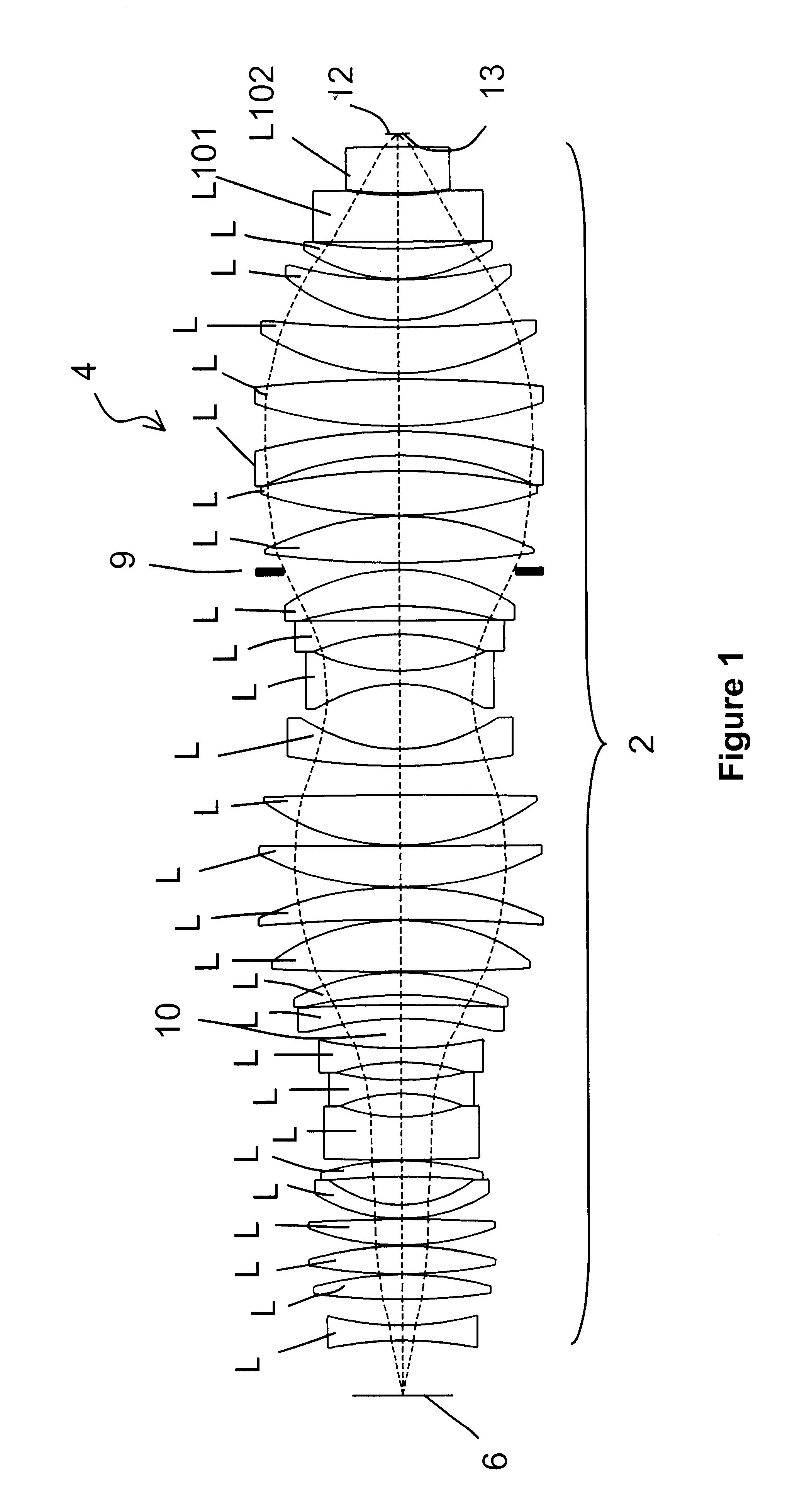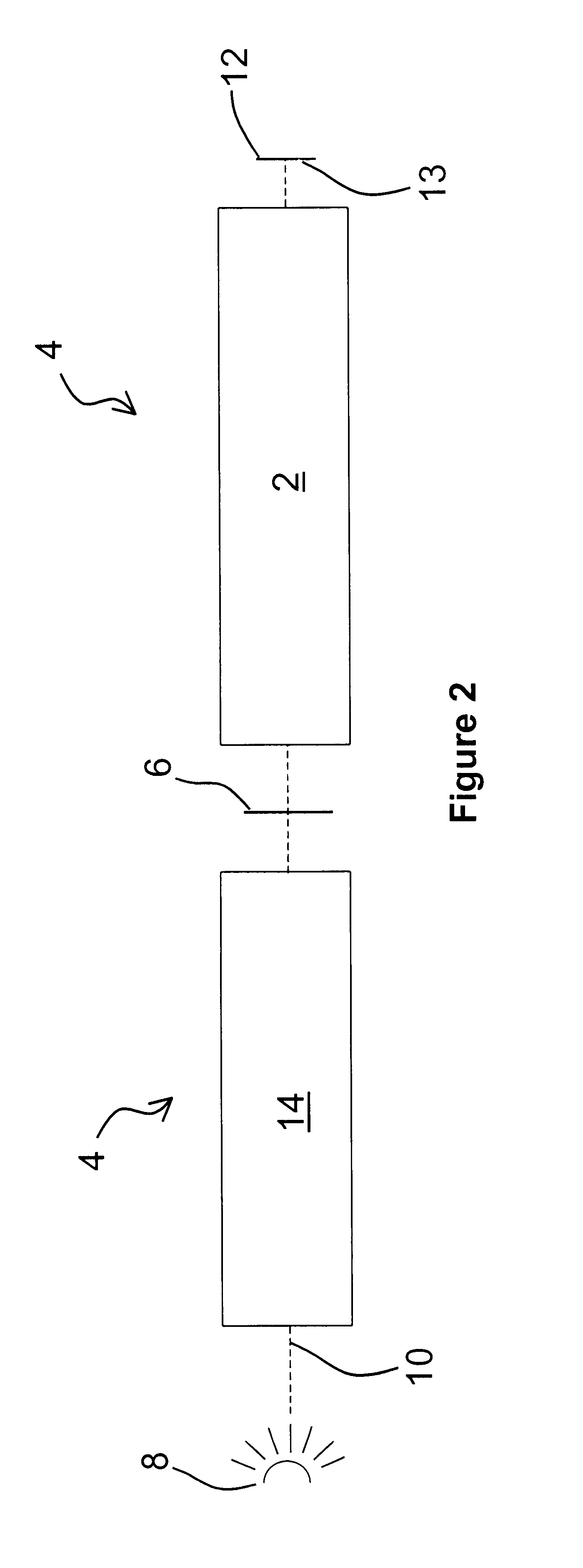Correction of birefringence in cubic crystalline optical systems
a cubic crystalline optical system and birefringence technology, applied in the field of birefringence correction in cubic crystalline optical systems, can solve the problems of different wavefront aberrations, degrade image resolution, introduce field distortion, and optical path difference or retardance, etc., to achieve the effect of reducing retardan
- Summary
- Abstract
- Description
- Claims
- Application Information
AI Technical Summary
Benefits of technology
Problems solved by technology
Method used
Image
Examples
embodiment 1
This embodiment may be applied to the exemplary optical system shown in FIG. 6. In embodiment 1 of the present invention, the first two elements 46 and 44 are oriented along the [110] cubic crystalline lattice direction and the third element 42 is oriented along the [100] lattice direction, although the specific order of the elements may be varied in other exemplary embodiments. Furthermore, the crystal lattices of the [110] first 46 and second 44 elements are rotated by 90 degrees with respect to one another in a plane perpendicular to the optical axis. This rotation about the optical axis is known as "clocking".
FIGS. 8A, 8B, and 8C are graphical illustrations showing the retardance magnitude and orientation over the pupil for the individual elements in the arrangement of the first exemplary embodiment of the optical system shown in FIG. 6, as described above. FIGS. 8A, 8B and 8C represent the individual retardance contributions for the first 46, second 44, and third 42 cubic cryst...
first embodiment
According to another exemplary embodiment, the residual error in FIG. 9B may be further reduced by a birefringent element that produces radially-oriented retardance that increases in magnitude from the center to the edge of the component. Such an element may be produced by applying a hoop stress to the edge of a meniscus optical component and added to the exemplary optical system of the first embodiment and as shown in FIG. 6. The applied stress creates a spatially varying birefringence to compensate for the computed or measured birefringence variation within the optical system as shown in FIG. 9B. Various stresses may be applied to various optical elements to achieve the spatially varying birefringence. The stressed optical element may be a lens element or a window and aligned along the optical axis. Various techniques may be used to apply the stress.
FIG. 9D shows the spatial radial retardance variation induced by applying an exemplary compressive hoop stress of 1000 pounds per squ...
embodiment 2
According exemplary embodiment 2, the present invention provides an apparatus that achieves reduced retardance through the use of at least four [110] optical elements and at least one [100] optical element. In the illustrated embodiment shown in FIG. 10, the present invention provides an apparatus having four elements with their [110] crystal axes along the system optical axis and one element with its [100] crystal axis along the system optical axis.
The relative orientations of the lattice directions in the plane perpendicular to the optical axis may be adjusted for the [110] optical elements. This technique is known as "clocking" or rotating the crystal lattice orientation of elements aligned along a common optical axis. The relative orientations may be selected in a particular manner that relates to the azimuthal orientations of the off-axis peak birefringence lobes.
Referring to FIG. 4, there are peak birefringence lobes at 60.degree. with respect to the [110] crystal axis, corres...
PUM
| Property | Measurement | Unit |
|---|---|---|
| wavelength | aaaaa | aaaaa |
| wavelength | aaaaa | aaaaa |
| wavelength | aaaaa | aaaaa |
Abstract
Description
Claims
Application Information
 Login to View More
Login to View More - R&D
- Intellectual Property
- Life Sciences
- Materials
- Tech Scout
- Unparalleled Data Quality
- Higher Quality Content
- 60% Fewer Hallucinations
Browse by: Latest US Patents, China's latest patents, Technical Efficacy Thesaurus, Application Domain, Technology Topic, Popular Technical Reports.
© 2025 PatSnap. All rights reserved.Legal|Privacy policy|Modern Slavery Act Transparency Statement|Sitemap|About US| Contact US: help@patsnap.com



